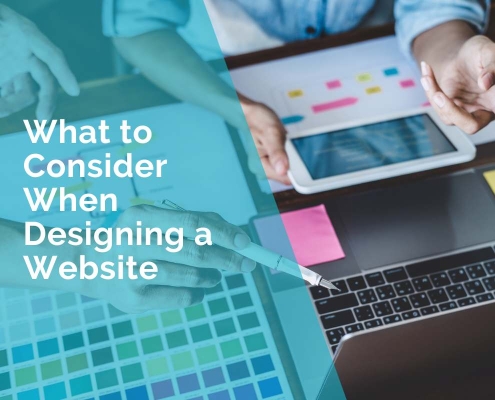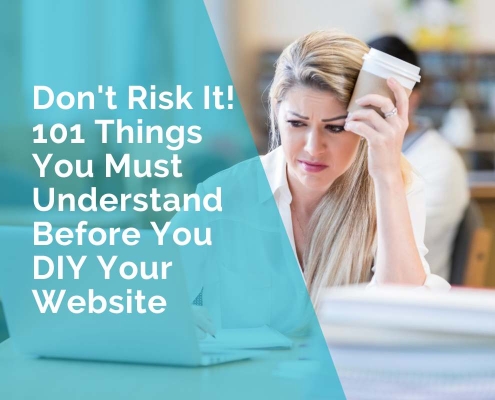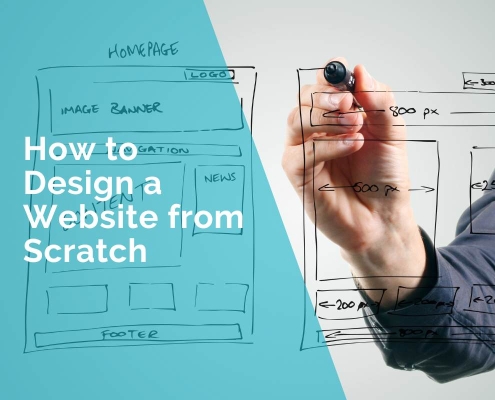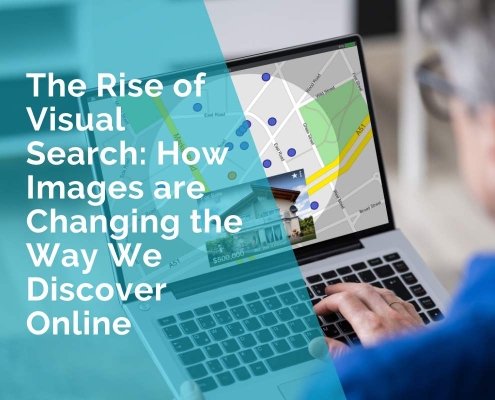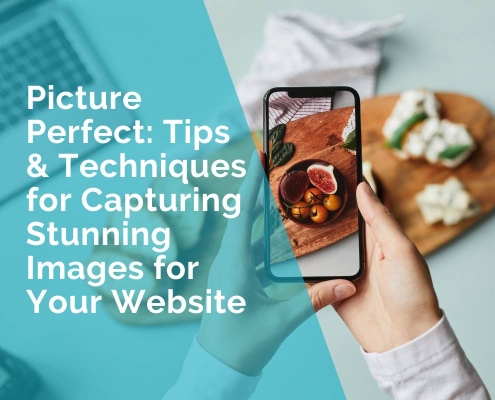Do I Need a Website For My Small Business?
Ever wondered do I need a website for my small business?
The simple answer is yes, if you have a small business, you definitely need a website!
Think of a website as your business’s online home. It’s where people can get to know you, check out what you offer, and decide if they want to be a part of what you’re doing. It’s like having a storefront on the internet that’s open 24/7.
Diving into the whole website thing can seem a bit overwhelming. But don’t worry, we’re here to help you figure it out.
Whether you’re offering services that make people’s lives better or selling awesome products, having a website can make a big difference.
Many businesses gravitate towards social media platforms as their primary online presence. While social media undoubtedly offers numerous advantages, it’s crucial to recognize the limitations and potential drawbacks of relying solely on these platforms.
Here are key points that illustrate why relying on social media as your primary online may not be the best strategy:
- Limited Control over Presentation:
- Social media platforms impose design constraints, limiting your ability to control the visual presentation of your brand or content fully.
- A standalone website provides the flexibility to craft a unique and customizable online identity.
- Vulnerability to Platform Changes:
- Social media algorithms and policies frequently evolve, impacting the visibility and reach of your content.
- Relying solely on platforms puts you at the mercy of these changes, potentially affecting your audience engagement.
- Lack of Ownership and Independence:
- Social media platforms own the space your content occupies, leaving you with little control and ownership.
- A website is a digital asset you own, offering independence and freedom from platform-specific restrictions.
- Competitive Visibility Challenges:
- Social media feeds are congested with content from various sources, making it challenging to stand out organically.
- A website provides a dedicated space where your brand can shine without competing for attention in crowded feeds.
- Data and Analytics Limitations:
- Social media analytics may not provide the depth of insights available through dedicated website analytics tools.
- A standalone website allows for comprehensive tracking of user behavior, enabling data-driven decision-making.
- Inconsistent Branding Opportunities:
- Social media platforms may limit the consistency of branding elements across different features and profiles.
- A website offers a cohesive and unified branding experience, reinforcing brand identity across all pages.
- Limited Content Monetization Options:
- Social media platforms may limit opportunities for content monetization or revenue generation.
- A website provides more flexibility in implementing diverse monetization strategies, such as e-commerce, ads, or subscription models.
- Susceptibility to Outages and Downtime:
- Social media platforms occasionally experience outages, leaving businesses temporarily without an online presence.
- A self-hosted website minimizes the risk of downtime and ensures continuous accessibility to visitors.
- Platform Lifespan and User Migration:
- Users often change the platforms they use, leading to shifts in user demographics or popularity.
- The decline of platforms like MySpace demonstrates the volatility of social media, with users migrating to newer platforms.
- Security Risks and Hacking Concerns:
- Account security risks pose a threat, with the potential for hacking leading to loss of control over your content, reputation, and communication with your audience.
- Relying solely on social media for your online presence may expose your business to increased vulnerability in the event of a security breach.
Do I need a website for my venture?
“A website is not just a tool; it’s the cornerstone of a successful business. Your online presence is a reflection of your brand’s identity, and a website serves as the virtual storefront that opens doors to endless possibilities and opportunities for growth.”
Ivana Katz
Benefits of Having a Website
A. Increased Visibility and Accessibility
Explore Untapped Markets:
- A website dismantles geographical boundaries, enabling your business to connect with audiences beyond your immediate locale.
- Target new markets and demographics, broadening your customer reach and diversifying your clientele.
Target Diverse Demographics:
- Tailor your online presence to resonate with various age groups, interests, and cultural backgrounds.
- By catering to different demographics, your website becomes a versatile tool for appealing to a wide spectrum of potential customers.
Constant Engagement:
- Your website acts as a perpetual storefront, providing potential customers with information about your business at any time.
- Ensures continuous engagement, accommodating varying schedules, time zones, and preferences of a diverse audience.
Convenience for Customers:
- Offers unparalleled convenience, allowing customers to browse and learn about your products or services whenever it suits them.
- Ideal for capturing the attention of individuals with different daily routines or those who prefer researching and shopping outside traditional business hours.
B. Credibility and Professionalism
Transparent Information:
- A well-crafted website instils trust by providing transparent and accurate information about your business, offerings, and contact details.
- Transparency builds confidence and fosters trust, essential elements for establishing long-term relationships with customers.
Showcasing Testimonials and Reviews:
- Displaying customer testimonials and reviews on your website serves as social proof, reinforcing the credibility of your products or services.
- Positive feedback from satisfied customers enhances your reputation and helps in building trust among potential clients.
Consistent Branding:
- A website allows you to maintain consistent branding elements, including logos, colours, and messaging, reinforcing a cohesive brand identity.
- Consistency across online platforms enhances brand recognition and establishes a strong visual identity in the minds of your audience.
Professional Presentation:
- A well-designed website projects professionalism, indicating that your business is serious and invested in providing a quality experience for customers.
- Professional aesthetics contribute to positive first impressions, a crucial factor in building a strong and reputable brand image.
C. Marketing and Promotion
Digital Marketing Opportunities:
- Online platforms provide cost-effective advertising avenues, including social media, search engine optimization (SEO), and email marketing.
- Digital marketing allows you to target specific audiences, measure campaign effectiveness, and optimize strategies for maximum impact within budget constraints.
Global Reach at Lower Costs:
- Compared to traditional advertising methods, online marketing offers a global reach at significantly lower costs.
- Small businesses can compete on a larger scale, reaching a broader audience without the hefty price tags associated with traditional advertising channels.
Showcasing Products/Services a. Visual Appeal:
- A website provides a visually appealing platform to showcase your products or services through high-quality images, videos, and detailed descriptions.
- Visual representation enhances the attractiveness of your offerings and entices potential customers to explore further.
Detailed Information:
- Customers can access comprehensive information about your products or services, including features, specifications, pricing, and availability.
- The ability to convey detailed information fosters informed decision-making among potential customers, leading to higher conversion rates.
D. Customer Engagement and Feedback
Interactive Features:
- Incorporating interactive features such as contact forms, live chat, and social media integration facilitates direct communication with customers.
- Enables customers to ask questions, seek assistance, or provide feedback in real-time, fostering a sense of accessibility and personalized service.
FAQs and Knowledge Base:
- A website can house a comprehensive FAQ section and knowledge base, addressing common customer queries and providing self-help resources.
- Offering readily available information enhances customer satisfaction and reduces the need for extensive customer support.
Collecting Valuable Customer Insights a. Surveys and Feedback Forms:
- Implementing surveys and feedback forms on your website allows you to gather valuable insights into customer preferences, satisfaction levels, and areas for improvement.
- Customer feedback serves as a valuable resource for refining products/services and enhancing overall customer experience.
Analytics and User Behavior Tracking:
- Utilizing website analytics tools enables the tracking of user behaviour, helping you understand how visitors interact with your site.
- Data-driven insights empower informed decision-making, allowing you to optimize the user experience and tailor your offerings to customer preferences.
The question “do I need a website for my business” is a resounding “Yes.” In today’s digital age, establishing a strong online presence is not just beneficial but essential for business growth and sustainability. A well-designed website serves as a virtual storefront, offering 24/7 accessibility to potential customers, enhancing credibility, and providing a platform for effective communication. With consumers increasingly relying on the internet to discover and engage with businesses, having a website is a strategic investment that can significantly contribute to the success of a small business. In order to thrive in the competitive market landscape, embracing the power of a website is a crucial step toward reaching a broader audience, building brand awareness, and ultimately achieving long-term success.
 Ivana Katz from Websites 4 Small Business is an award winning web designer who builds websites that build your business. She provides unbeatable web design services to fit your budget.
Ivana Katz from Websites 4 Small Business is an award winning web designer who builds websites that build your business. She provides unbeatable web design services to fit your budget.
The end result? Professional, custom-made sites that give your business the extra oomph it needs to stand out from the competition and make an impact.
Whether you’re a brand-new business or an established one ready to improve your digital presence, Ivana makes it easy to get your business online very quickly. Her websites are professional, tailored to fit your budget, and give your business a serious boost.
Download your FREE copy of “Ultimate Website Design Secrets Blackbook – 10 Bulletproof Strategies for Designing an Outrageously Successful Website”


